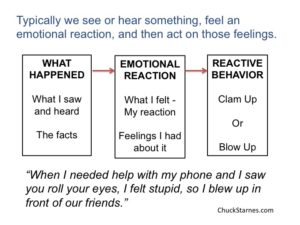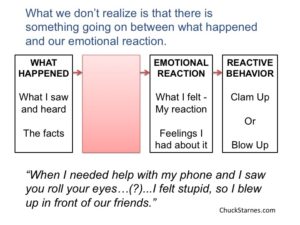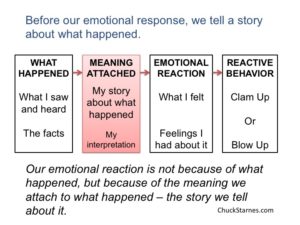No marriage relationship can stay connected if one person is highly reactive.
Whenever emotions are out of control, the conversation will never be safe. And feeling connected will not be possible.
Here are three powerful insights that can help us regulate our emotions and help us stay present and connected with our partner.
1. Our feelings drive our behavior.
Who me? No, never. Not me. I believe you should do what’s right regardless of feelings!
Riiiiight!
I used to be so naive.
But after a few decades of marriage, I discovered this was almost never the case.
Why? Because’¦
The feelings that drive our actions are almost always unconscious.
Seems like negativity would always spew out of my mouth whenever my unconscious fear or anger was triggered. And the results were never good.
And this all happened without my even knowing it.
Before I could process anything in the thinking part of my brain (cortex), the critical retort was already out of my mouth and I was in trouble.
Can you relate?
Problem is the neurons triggered from our lower, reactive brain travel 10 times faster than those from the top down. That’s why it so difficult to not be reactive to your partner.
The moment that reaction occurs, the conversation is no longer safe. And the kind of dialogue that leads to connection is not possible.
Here’s how it usually goes down. I learned this from the book, Crucial Conversations.
The example in the graph is a wife I previously shared about.
She grew up in a home where her father and brothers were engineers, and her mom and sister were nurses. She was the ‘artistic’ one.
Although she was very talented, she always felt ‘dumb’ growing up with all those math and science whizzes.
So now in her marriage, just a ‘5-watt’ eye-roll from her husband triggers a ‘1000 watt’ reaction.
Ok. I get it. That makes sense. But how do I get control of my emotions and all this overreaction?
The key to controlling our emotions is learning where they come from.
There is something that happens lightening fast between the time we see or hear something and the feelings we create in response.
We often say, ‘He made me mad.’ Or, ‘She upset me.’
The truth is no one can make you mad.
‘What? What do you mean no one can make me mad? It happens all the time!’
No, actually, you make yourself mad.
Something happens between what you see and hear and the feeling you create.
‘OK. I give up. What is that?’
2. Our ‘stories’ drive our feelings.
The story we tell ourselves, or the meaning we attach to an event is what creates our feelings.
I see or hear something.
Then…I attach meaning to it. I tell a story about it. I interpret it. I judge what motives are behind it. I tell myself whether it’s good or bad, safe or dangerous.
And this all happens in a flash.
That’s what creates my feelings.
So I do create my own feelings after all…hmm.
The path to action we take begins with what we see and hear.
Then we tell a story about what we saw or heard.
That story then creates feelings.
And finally those feelings drive our behavior.
When we are in a reactive mode, that behavior takes one of two directions: clamming up or blowing up.
Both of these options destroy any chance of a healthy dialogue, and leave us feeling disconnected from each other.
Sandy says, ‘Do you have to take your phone whenever we go for a walk?’
What story do I tell? ‘She’s trying to control me.’
That story creates feelings of anger or fear.
Then like a hailstorm I react. Or like a turtle, I withdraw into the safety of my shell. Yes, I can be a hailstorm or a turtle.
Clamming up or blowing up never gets me what I really want. Only safe dialogue can keep us close and connected.
That’s because my reaction is only the beginning.
My reaction triggers Sandy’s pain and defenses. If she responds in kind, the conflict is on.
How do I know so much? I’ve lived this scene over and over again. ‘Second verse, same as the first, a little bit louder and a little bit worse’.
But I’m learning that if I can catch my story, and hold it tentatively, I can change the feelings I create before there is a reaction and things go south.
Even if my story is true, even if Sandy IS trying to control me, I can confront the issue in a safe dialogue which brings us closer rather than blowing us apart.
Make sense?
In scientific terms, I have to give time for the neurons that move top down from my thinking brain to my reactive brain.
When I stay in my thinking brain, I can master my story and then tell it in a way that doesn’t trigger hurt and reaction.
So what’s the conclusion of all this?
3. If I change my story, I change my emotions, and thus my behavior.
So what does this look like?
Crucial Conversations gives some great sentence stems that help you turn your brain back on, and keep you curious and present rather than critical and reactive.
Here’s the one I used.
I looked at Sandy and asked myself, ‘Why would a reasonable, rational, decent person like Sandy say that?’
And, as I used this stem to keep my brain turned on, and to become curious about what Sandy was feeling, the answer came.
‘Oh yeah, she just wants to spend some uninterrupted time with me. That makes sense. That’s why always being on my phone is a frustration to her. I get it.’
Change my story – change my feelings – bingo! Changed my behavior!
Even with the negative vibes I felt from Sandy’s frustration, this tool kept me from reacting and helped us stay in dialogue.
This is how we can turn a negative feeling into a positive interaction that leads us to deeper connection.
This is how to avoid spiraling downward into a negative interaction.
And this is how we had a great walk, a great conversation, and ended up feeling closer to each other rather than hurt and angry.
If you change your story, you change your feelings.
Then you can respond in a way that gets you what you want. For yourself, for your partner, and for your relationship.
Try it and let me know how it goes in the reply section below!
My goal is to provide free relationship resources delivered to your email inbox every Saturday morning! To receive my weekly blogpost just subscribe below.






Love this one Chuck
Great post and soooooo true
Thank Brent!
This is so true and so me. I have to really work on not being reactive but am finding it gets better with practice and for me meditation helps. It slows down the reaction time and gives me a nanosecond longer to get to my thinking brain. Thanks Chuck!